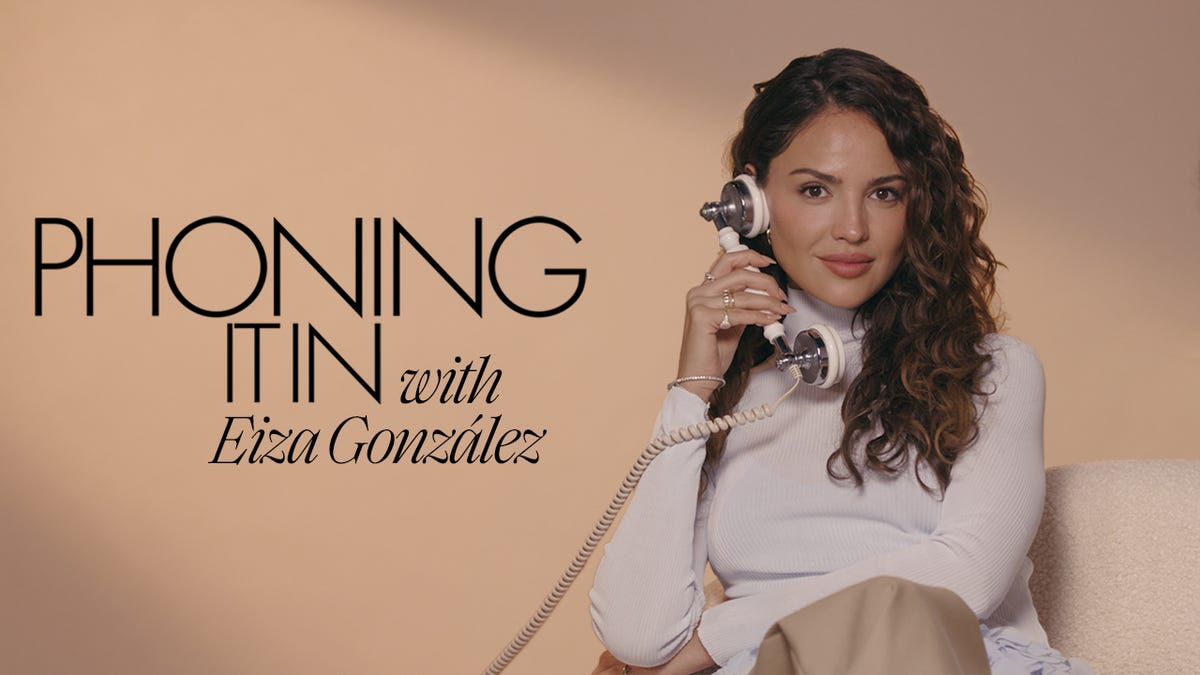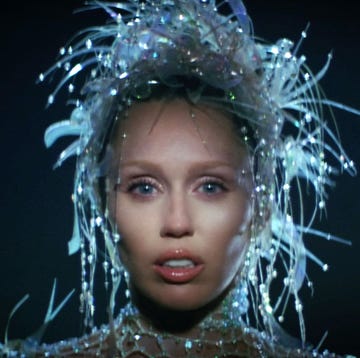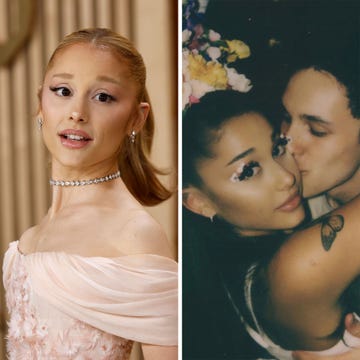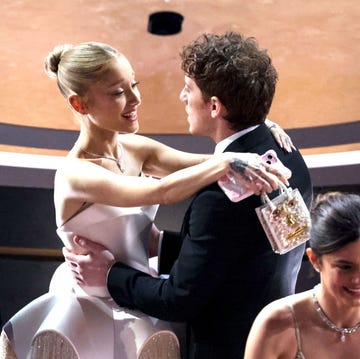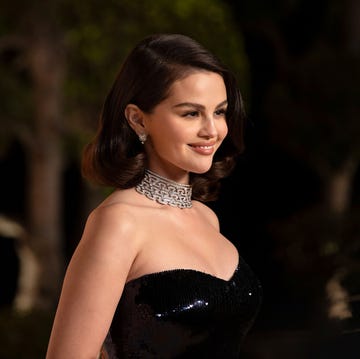A number of years ago I made the mistake of attending an Alison Krauss and Union Station concert shortly after a breakup. The band was only one number into the set—maybe it was “So Long So Wrong”; maybe “Ghost in This House” or “Every Time You Say Goodbye”—when the tears began to flow down, as that last song says, like rain on the ground. The friend seated next to me looked over and nodded; she got it. How is anyone supposed to listen to Alison Krauss without crying?
Fans have a new chance to test their mettle this year, as the ethereal singer and her peerless band return with a new album, Arcadia, out March 28, and a 77-date North American tour kicking off April 17. Krauss, who was famously signed by Rounder Records as a 14-year-old fiddle prodigy, has been performing for nearly four decades. But on Arcadia, her Baccarat-crystal-clear soprano is fully intact, as is the band’s musicality and genre-blending mix of bluegrass, roots, rock, and adult contemporary sounds. (Dan Tyminski, the band’s former guitarist and singer, has stepped aside to focus on his solo career; he’s replaced by accomplished bluegrass vocalist Russell Moore.)
Arcadia is Krauss’s first work with Union Station in 14 years. In between, her projects included an album of old-school country covers, Windy City, and two albums with Led Zeppelin’s Robert Plant—including 2007’s Raising Sand, which yielded Grammy Awards for both Album of the Year and Record of the Year. With 27 Grammys in total as a performer and producer, Krauss is not just the most lauded artist in bluegrass, but one of the most celebrated women in music, period—only Beyoncé has more trophies.
Not that Krauss seems to be counting. Calling in from her home in Tennessee on a gloomy early-spring morning, she lights up as she talks about the collaboration that drives her career (not only with the various rotating members of Union Station over the years, but with fellow breakup-song legends like Dolly Parton and Taylor Swift). Asked about her own achievements and what goals remain, she seems genuinely modest. “Every time you make a record, every time you tour, it’s like the only time you’ve ever done it, and the last time you’ll ever do it,” she says. “My goal is to do a good job. Which is not always easy! But when people come, I just want them to have a nice time.” Good luck not crying, though.
You’re known as a genius song collector versus song writer—you have a gift for finding songs and putting them together. What’s your process of curating an album generally, and for this new album in particular?
Oh, it’s probably my favorite thing—it's so exciting when you find a song that works for the band. For a lot of songwriters, the writing is a tough process; it’s an emotional process. It’s heavy. For me, when I find something it's only joy. I didn’t have to go through the terrible thing they went through. [laughs] It’s almost like when I find one, there's an urgency to get to sing it, or to hear the guys sing it and play it. And sometimes you have a song that has been sitting around for years; they just haven’t found a place yet with the other tunes that you find. And you have to find, for me, a first song that starts a whole experience. So the song that I found [for Arcadia] was called “Looks Like the End of the Road.” I heard it and probably the first half of the first verse I lost my mind. That was the first thing, and then everything else I’ve been gathering for years. It just all came together.
I tend to associate you with songs about lost love, but “Looks Like the End of the Road” seems to be about even bigger life regrets than that—the decisions, the mistakes that you can’t unmake. Is that a fair interpretation, or am I working out my own issues there?
One thing I think about is that people gather their own interpretation. I heard lost love, too. My mom, when she heard that song, it reminded her of what it must have been like for my dad to come over to this country after World War II, saying goodbye to what he knew. People grab on to certain lyrics, and there could be a line there that makes something their own story. Pulling the plug from the jug and drinking it down, that's not me so much, but betrayal, getting pulled into something that wasn't true, there are so many ways that you do relate to the stories. Humans all have the same emotions, the circumstances just change.
Speaking of changing circumstances, being in your fifties can bring up some reflection on the past and future. Does singing a song like “Looks Like the End of the Road” hit differently than it might have 20 years ago?
I don’t know! There’s so many times in your life you would relate to the chorus of that song. But being older, it’s so funny. My mom told me, “You know when you get to 50, everything's different. Today I went through the wrong door at the library and the alarm went off. And I didn't care! That’s 50.” I keep waiting for that moment for myself.
On this album, Russell Moore tends to sing the upbeat songs, and then you tend to have these plaintive ballads. Why are you so drawn to interpreting sad songs?
I love the hope. When you sing something like that—that’s a survivor. It’s an encouragement to hear it. I’ve always felt that way: Those sad tunes create a longing and a hopefulness for the future to me.
Is that why you think breakup songs have so much power?
It’s singing about something beautiful that happened. And the possibility of something beautiful happening again. Those things are healing. Because it was told in a song, it will never be forgotten. Some of those things are too hard to [speak about]. Throughout history you’ve seen it: With a lot of those folk music ballads, you might not even know that those things happened if it wasn’t forever put in a beautiful melody. It’s how people remember.
And bluegrass in particular is about documenting that history and creating that thread to the past, whether that’s personal history or the history of this country.
People want to remember and honor the past. A lot of people in this music, they all say the same thing: “I was born in the wrong decade.” They dream about the past, when the songs were written, and what life was like then. I always knew that people daydreamed about what life was like when our grandparents were young. We’re just far enough to be safe, but connected to it at the same time. That’s why art is so important in the world, what it does for your mind, what it does for your daydreaming life. I always wonder, how much of a person’s life is molded by experience, and how much by what you daydream about? Those stories you dream about when you are listening to music, I really think it’s a good percentage of what people become.
Who are the artists you love to listen to recently?
Somebody new, and I just love her, is Sierra Ferrell. I just think she’s as good as anyone’s ever been. I haven’t gotten to watch her live yet, but as soon as we are done with this tour, that’s my destination.
Do you feel like you've grown into any kind of mentorship role with younger artists, where they ask you for advice musically, or career advice?
Oh, I don’t know if I feel like that. But if anybody asks me, I always say, “Make sure you like the songs you are singing.” Because that stuff coming out of your mouth is important—what you say, what you sing. You have to have an agreement with it, because it’s all you have at the end of the day, when you’re going to bed and it’s just you.
Collaboration seems like a theme of your career. What is it that drives you to work with so many other artists?
Well you know, harmony singing in bluegrass is the most important thing. Like, people don’t go to prom because they are sitting around singing harmonies. They skip major life events. [laughs] It’s a magical thing to match another person’s phrasing. When you’re listening to music, you just hear the beauty of something. When you’re in the studio and you’re trying to match somebody, you hear all the tiny little things they do that make them, them. I especially like it with those iconic voices. Like with Dolly Parton, I’ve sung on a number of her records over the years, and she does these microscopic moves that sound so beautiful and so easy when you are listening; it sounds like the most natural thing in the world—which it is for her. But you get headphones on and you try to match it, and it's shocking! And it’s a tough gig because trying to match her and get in her phrasing is like calculus or something. Cyndi Lauper, same with her. Unbelievable. She reminds me of Dolly a lot, she has that encouragement, that really special light that some people carry.
I was also just watching your acoustic performance of “Red”—speaking of breakup songs—with Taylor Swift on the CMA Awards, harmonizing with her and Vince Gill.
Let me tell you a story about that. There was a show I did with her here in Nashville where she played the arena and she had people come as guests. [The pair dueted on the Alison Krauss and Union Station hit “When You Say Nothing At All” on the 1989 World Tour.] There were hundreds of people walking around working to put this concert together, and from the very second you walk in, every last person is the kindest person you could come across. The way that they take care of their guests is the classiest, kindest environment. And I brought a little gal with me, the daughter of someone I work with in the studio, and they allowed her and my son, who was pretty young at the time too, to come to sound check. [Taylor] went down there and talked to them and they were just completely blown away. It was just so moving to see. I haven’t been around her a lot, but I saw enough to know that’s a very special person.
I know you've had some vocal challenges in the past, but your voice sounds clear as a bell on this record. How do you take care of it? Do you feel a kind of responsibility to take care of your voice, because it is so special?
Aw! You know, sometimes people just get tightened up. There are a lot of people who have had it—Shania Twain, even perfect, perfect Renée Fleming. It’s called dysphonia, and your throat gets tight and stays like that. And usually it has to do with getting mentally too bogged down in things. And so you have to make sure you are clearing your desk off. And it’s interesting, apparently it happens more with women. I went to see a voice coach named Ron Browning here, I call him Yoda. He’s the Jedi master and after a while, I would just have to show up there and my throat would be fine. You have to be free when you are singing, and if you are not feeling free, it will lock up on you.
This interview has been edited and condensed for clarity.



